| Chow Chow | |||||||||||||||||||||||||||||||
|---|---|---|---|---|---|---|---|---|---|---|---|---|---|---|---|---|---|---|---|---|---|---|---|---|---|---|---|---|---|---|---|
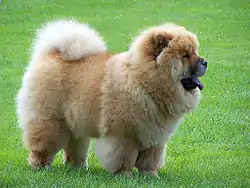 A cinnamon Chow Chow puppy | |||||||||||||||||||||||||||||||
| Other names | Chow | ||||||||||||||||||||||||||||||
| Origin | China | ||||||||||||||||||||||||||||||
| |||||||||||||||||||||||||||||||
| |||||||||||||||||||||||||||||||
| Dog (domestic dog) | |||||||||||||||||||||||||||||||
The Chow Chow is a spitz-type of dog breed originally from Northern China.[3] The Chow Chow is a sturdily built dog, square in profile, with a broad skull and small, triangular, erect ears with rounded tips. The breed is known for a very dense double coat that is either smooth or rough.[1]: 4–5 The fur is particularly thick in the neck area, giving it a distinctive ruff or mane appearance. The coat may be shaded/self-red, black, blue, cinnamon/fawn, or cream.[1]: 4–5 [4]
History
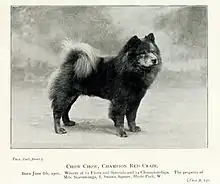
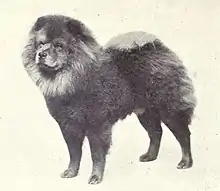
The Chow Chow has been identified as a basal breed that predates the emergence of the modern breeds in the 19th Century.[5] One writer proposed that the Chow Chow originated in China 2,000 years ago or possibly originated in Arctic Asia 3,000 years ago which migrated to Mongolia, then to China.[1]: 11
One Chinese legend mentions large war dogs from Central Asia that resembled black-tongued lions. One Chinese ruler was said to own 5,000 Chows. The Chinese also used Chows to pull dog sleds through swampy terrain, and this was remarked upon by Marco Polo.[1]: 11
Today, the American Kennel Club registers approximately 10,000 Chow Chows a year. The Canadian Kennel Club registers approximately 350.[1]: 4–5
Appearance
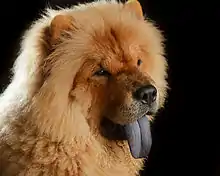
The Chow Chow is a sturdily built dog, square in profile, with a broad skull and small, triangular, erect ears with rounded tips. The breed is known for a very dense double coat that is either smooth or rough.[1]: 4–5 The fur is particularly thick in the neck area, giving it a distinctive ruff or mane appearance. The coat may be shaded/self-red, black, blue, cinnamon/fawn, or cream.[1]: 4–5 [4] Not all these color varieties are recognized as valid in all countries. Individuals with patchy or multicolored coats are considered to be outside the breed standard. Chow Chow eyes are typically deep set and almond shaped. The breed is unique by their purple/blue-black tongue which no other breed has except Shar Pei, and has very straight hind legs, resulting in a rather stilted gait.[1]: 4–5 The bluish color extends to the Chow Chow's lips; this is the only dog breed with this distinctive bluish color in its lips and oral cavity (other dogs have black or a piebald pattern skin in their mouths).[1]: 4–5 Another distinctive feature is the curly tail.[1]: 4–5 It has thick hair and lies curled on its back. The nose should be black, but blue-coated Chow Chow can have a solid blue or slate-colored nose. According to the American Kennel Club breed standards, any other tone is not acceptable for contests.[6] FCI countries, however, do allow a self-colored nose in the cream.[7]
The blue-black/purple tongue gene appears to be dominant, as most mixed breed dogs that come from a Chow Chow retain that tongue color. However, the blue-black/purple tongue can also be found on the Shar Pei. This is not to say that every mixed breed dog with spots of purple on the tongue is descended from Chow Chow, as purple spots on the tongue can be found on other purebred dogs.[8]
- The distinctive Chow Chow features
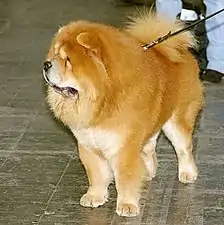 Straight hind legs
Straight hind legs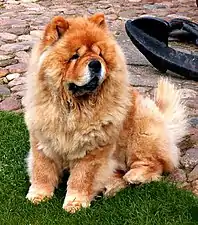 Dense double coat on a male Chow Chow
Dense double coat on a male Chow Chow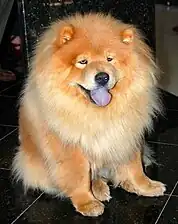 Purple-black tongue in a female Chow Chow puppy
Purple-black tongue in a female Chow Chow puppy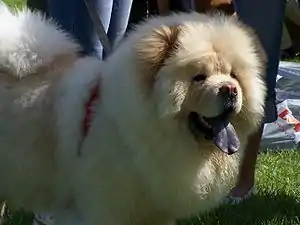 Bluish lips and oral cavity
Bluish lips and oral cavity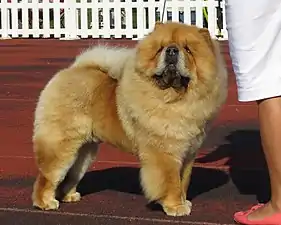 Sturdy build, square in profile
Sturdy build, square in profile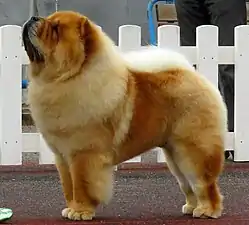 A reddish-brown Chow Chow
A reddish-brown Chow Chow
Temperament
Most commonly kept as pets, Chow Chows tend to display discernment of strangers and can become fiercely protective of their owners and property. The American Kennel Club standards, however, consider an all-too aggressive or all-too timid Chow Chow to be unacceptable.[6] For that reason, some owners have attributed a cat-like personality to the Chow Chow.[9]
Chow Chow are not excessively active, meaning that they can be housed in an apartment. However, a Chow Chow living in an apartment will need daily exercise to prevent restlessness and boredom. Upon realizing that exercise is a daily occurrence, Chow Chow will tend to be more assertive with owners in anticipation of such activities.
This breed of dog has many strong loyal bonds with friends and family, but the Chow Chow dog is usually overly protective of one or two main family members.[10] It is in the breed's nature to be quiet and well-behaved, but it is also resistant to training. Chow Chows become very stubborn and attach to certain individuals as they age. This makes training them when they are puppies crucial, because they gain respect for those who care for them.
To avoid aggression and over-protectiveness as an adult, continuous socialization as early as possible could allow the dog to adjust. When a Chow Chow reaches adolescence it rejects authority from any owner who failed to earn its admiration. Aggression can be one distinctive behavioural characteristic in this breed, though while some are of an aggressive nature, many are known to be easy-going in nature – sometimes adopting an aloof disposition to individuals other than their owners. Aggression when it does appear is often towards other dogs of the same gender, especially Chows. Due to their strong hunting instincts, it is recommended that these dogs stay fenced, leashed, and away from cats and small dogs. This is why it is crucial that they are socialized early and consistently to act appropriately with strangers. At first, Chow Chows are very hesitant in interacting with strangers. However, this problem can be avoided if the owners train the Chow Chow at a young age.
Owning a Chow Chow can raise the cost of homeowners insurance because some companies consider them high-risk dogs.[11] In a study in the Journal of the American Veterinary Medical Association, Chow Chow were responsible for 8 out of 238 fatalities related to dog bites from 1979 to 1998.[12]
Colors
Chow Chows can come in a variety of coat colors. The American Kennel Club (AKC) has classified Chow Chow colors as either standard or non-standard (rare colors). The standard colors for Chow Chows are black, blue, red, cream, and cinnamon. However, colors such as fawn, white, and merle are not considered standard for this breed.[13][14]
It's important to mention that different canine clubs worldwide may acknowledge different coat colors or even use alternative names for the colors mentioned above.[14]
- The different Chow Chow colors
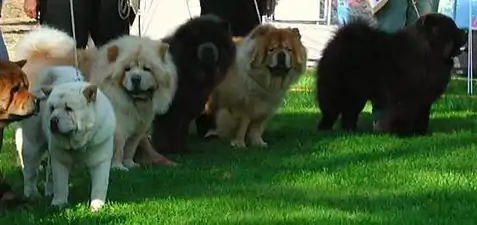 5 Chow Chows of different coat colors
5 Chow Chows of different coat colors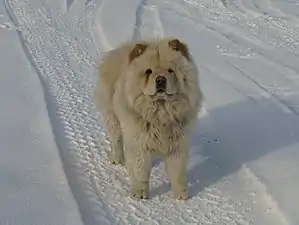 Cream
Cream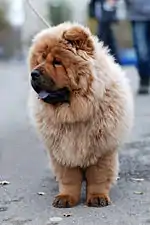 Fawn
Fawn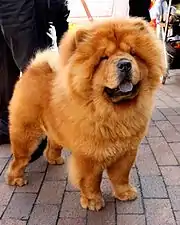 Red
Red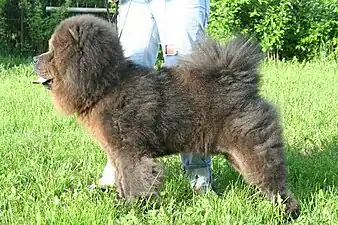 Blue
Blue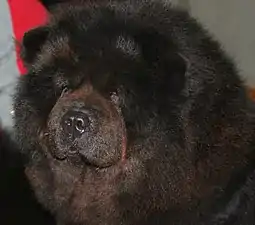 Black
Black
Health
The Chow Chow can suffer from entropion,[15][16] glaucoma,[17][18] juvenile cataracts,[19] lymphoma,[20] hip dysplasia,[21] diabetes mellitus,[22] canine pemphigus,[23] and gastric cancer.[24] Chow Chows are a high risk breed for autoimmune disease[25] and are at a predisposition for skin melanoma.[26]
Grooming
Chow breed will heavily shed their fur in the seasons of spring and autumn, which requires more grooming attention than other seasons. It is important that owners use the correct tool to avoid harming the skin and facilitate grooming. Three kinds of brushes that owners can use on their Chow Chow are a medium-coarse brush for the larger parts of the body, a slick brush for smaller areas, and a pin brush to maintain the longer strands of hair.[27] Chow Chows are known to have either short and smooth coat, or a rougher and longer coat. Both create a thick woolly layer, as it gets closer to the skin. They should be brushed four times a week; however shedding seasons may require daily grooming. Also, a spray conditioner can help avoiding breakage and tearing to the thick coat of hair. Lastly, a monthly bath is required to avoid fleas and keep a clean coat of fur.
 A Chow Chow with reddish coat
A Chow Chow with reddish coat The Chow Chow's fur is particularly thick in the neck area, giving it a distinctive ruff or mane appearance.
The Chow Chow's fur is particularly thick in the neck area, giving it a distinctive ruff or mane appearance.
Notable owners

Konrad Lorenz, an Austrian zoologist, ethologist, and ornithologist, winner of the 1973 Nobel Prize in Physiology or Medicine,[28] who is often regarded as one of the founders of modern ethology, had a Chow Chow mix named Stasi.[29] He wrote about his dogs in his book King Solomon's Ring.
Georgia O'Keeffe, an American artist, owned at least 6 Chow Chows in her lifetime. O'Keeffe wrote about her dogs in letters to friends and family, took photographs of them, and sketched them. She was a member of The Chow Chow Club, Inc. and kept various veterinary papers, club notifications, feeding schedules, and correspondence relating to her dogs.[30]
Sigmund Freud had a Chow Chow named Jo-Fi Ling who attended all of his therapy sessions because he felt that dogs had a special sense that allows them to judge a person's character accurately, and admitted he depended on Jo-Fi for an assessment of a patient's mental state.[31]
U.S. Navy admiral George Dewey acquired a Chow Chow in Hong Kong in 1898 and named it Bob. Bob rarely left the admiral's side and had the run of the cruiser USS Olympia. Bob died in 1899 due to eating chocolates given to Dewey by well-wishers upon Olympia's arrival in New York City.
Martha Stewart owns several Chows, which are frequently seen on Martha's shows.[32] One of them is named Genghis Khan.[33]
President Calvin Coolidge and his wife owned a black Chow named Timmy.[34]
Elvis Presley and his girlfriend Linda Thompson had a Chow Chow named Getlow.[35]
Vanna Bonta[36][37] had a cream Chow Chow named Sky, a blue Chow Chow named Seraph, and a red Chow Chow named Beowulf, who was immortalized as a fictional dog in the book Flight.
Janet Jackson had a Chow Chow named Buckwheat.[38]
Italian footballer Mario Balotelli bought his girlfriend two Chow Chow puppies in the UK.[39]
Walt Disney and his wife, Lillian Disney, had a Chow Chow named Sunnee. It was the couple's first dog. Allegedly, Walt gifted Lilly the Chow Chow inside a hat box, which inspired the scene in Lady and the Tramp where Lady is gifted in the same way.[40]
K-Pop artist Park Junhee has a Chow Chow named Lion.[41]
YouTuber Miniminter has a Chow Chow named Mushu, with his wife singer Talia Mar.[42]
See also
- Dogs portal
- List of dog breeds
- Eurasier, a dog-breed created through crossing Chow Chow, Wolfspitz and Samoyed dog
References
- 1 2 3 4 5 6 7 8 9 10 11 12 13 Wilcox, Charlotte (April 1, 1999). The Chow Chow. Capstone. ISBN 978-0-7368-0159-1.
- ↑ "Chow Chow Health & Care Information". AKC. Retrieved February 11, 2017.
- ↑ Case, Linda P. (2005). The Dog: Its Behavior, Nutrition, and Health (2nd ed.), p. 23. Blackwell Publishing. ISBN 0-8138-1254-2.
- 1 2 "Colours and coat types". Chow Chow Club. Archived from the original on March 28, 2012. Retrieved December 16, 2012.
- ↑ Larson, G (2012). "Rethinking dog domestication by integrating genetics, archeology, and biogeography". Proc. Natl. Acad. Sci. U.S.A. 109 (23): 8878–83. Bibcode:2012PNAS..109.8878L. doi:10.1073/pnas.1203005109. PMC 3384140. PMID 22615366.
- 1 2 American Kennel Club (January 1, 2006). "AKC MEET THE BREEDS: Chow Chow". American Kennel Club. American Kennel Club (AKC). Retrieved July 10, 2012.
- ↑ CHOWCHOW.at (June 9, 1999). "The FCI Breed Standard". CHOWCHOW.at. CHOWCHOW.at Alle Rechte vorbehalten. Archived from the original on August 11, 2012. Retrieved July 10, 2012.
- ↑ Kathy Welsh; Anna Wallace; Vicki DeGruy (2001–2010). "The Truth About Those Black Tongues". Chow Chow Information and Adoption Center. WisconsinChow Chow Rescue. Retrieved July 10, 2012.
- ↑ The Chow Chow Club, Inc.'s Welfare Committee (1997). "Chow Chow Temperament Evaluation, Handling & Placement Tips for Animal Shelters". Chow Chow Information and Adoption Center. Wisconsin Chow Chow Rescue. Archived from the original on February 14, 2020. Retrieved July 10, 2012.
- ↑ Breed. (n.d.). "Chow Chow. Petsource.org" Archived November 12, 2013, at the Wayback Machine. Retrieved April 3, 2013
- ↑ InsuranceAgents.com. "Will Your Canine Affect Your Homeowners Insurance Policy?". InsuranceAgents.com. AgentInsider.com. Archived from the original on October 14, 2012. Retrieved July 10, 2012.
- ↑ J. Sacks, Jeffrey; Sinclair, Leslie; Gilchrist, Julie (September 15, 2000). "Vet Med Today: Special Report – "Breeds of dogs involved in fatal human attacks in the United States between 1979 and 1998"" (PDF). JAVMA. 217 (6): 836–40. doi:10.2460/javma.2000.217.836. PMID 10997153. S2CID 10817039. Archived from the original (PDF) on April 11, 2015.
- ↑ "Chow Chow Dog Breed Information". American Kennel Club. Retrieved June 8, 2023.
- 1 2 Jones, Christina (June 18, 2021). "Chow Chow Colors: A Guide To Rare Colors Of Chow Chow Dogs". PupVine. Retrieved June 8, 2023.
- ↑ "Chow Chow Welfare: Entropion". www.chowwelfare.com.
- ↑ "Entropion in Dogs: Eyelids Folding Inward". VetInfo.
- ↑ "Glaucoma @ Animal Eye Care".
- ↑ "The Five Most Common Breed Specific Dog Health Problems". VetInfo.
- ↑ "Juvenile Cataracts in Dogs". VetInfo.
- ↑ "Identifiable Dog Lymphoma Symptoms". VetInfo.
- ↑ "Canine Hip Dysplasia". Archived from the original on June 28, 2011. Retrieved July 2, 2011.
- ↑ "Diabetes Mellitus". Archived from the original on October 2, 2011. Retrieved July 2, 2011.
- ↑ "Canine Pemphigus Treatment with Prednisone". VetInfo.
- ↑ "Positional Cloning of the Gene(s) for Gastric Cancer in the Chow Chow". Archived from the original on October 2, 2011. Retrieved July 2, 2011.
- ↑ "Establishment of a Genetic Database for Disease Association Studies in the Major Histocompatibility complex for Purebred Dogs". Archived from the original on October 2, 2011. Retrieved July 2, 2011.
- ↑ "Canine Skin Melanoma". VetInfo.
- ↑ Chow Chow Dog Breed | Information on Chow Chows. (n.d.). Pet Information | Online Resource for Pet Owners | PetWave. Retrieved April 3, 2013, from http://www.petwave.com/Dogs/Dog-Breed-Center/Non-Sporting-Group/Chow-Chow.aspx Archived April 3, 2013, at the Wayback Machine
- ↑ "Konrad Lorenz – Biographical, The Nobel Prize in Physiology or Medicine 1973s". Nobel prize, The Official Web Site of The Nobel Prize. 1973. Retrieved February 11, 2017.
- ↑ Konrad Lorenz (1961) King Solomon's Ring Translated by Marjorie Kerr Wilson. Methuen, London. 202 pages. ISBN 0-416-53860-6
- ↑ "The Chow Chows". Georgia O'Keeffe Museum. October 17, 2014.
- ↑ Coren, Stanley (1997). What Do Dogs Know?. Free Press. p. 128.
- ↑ "FACTS".
- ↑ The Paddock Play Continues – The Daily Wag – Pets – MarthaStewart.com Archived September 24, 2013, at the Wayback Machine. Dailywag.marthastewart.com (September 20, 2013). Retrieved October 23, 2013.
- ↑ Atkinson, James (1988). Chow Chows, p. 5. Barron's Educational Series. ISBN 0812039521.
- ↑ "ELVIS PRESLEY AND CHOW GETLOW". ChowTales. February 4, 2014.
- ↑ "Vanna Bonta is into Genes!".
- ↑ "Vanna Bonta Gets Her Dog a Lion Fur-Do - FamousFix". FamousFix.com.
- ↑ "Canine Aristocracy". Archived from the original on October 2, 2011. Retrieved July 2, 2011.
- ↑ News, Manchester Evening (December 2, 2011). "Meet the other wags: Salford pet shop has a Man United's best friend". men.
{{cite web}}:|last=has generic name (help) - ↑ "Walt Disney's Chow "SUNNEE" Inspires Movie". ChowTales. February 4, 2014. Archived from the original on January 16, 2016.
- ↑ "Official A.C.E". Twitter. September 20, 2021. Archived from the original on September 20, 2021.
- ↑ "OUR PUPPY JOINS MY STREAM". Youtube. February 1, 2023. Archived from the original on February 1, 2023.